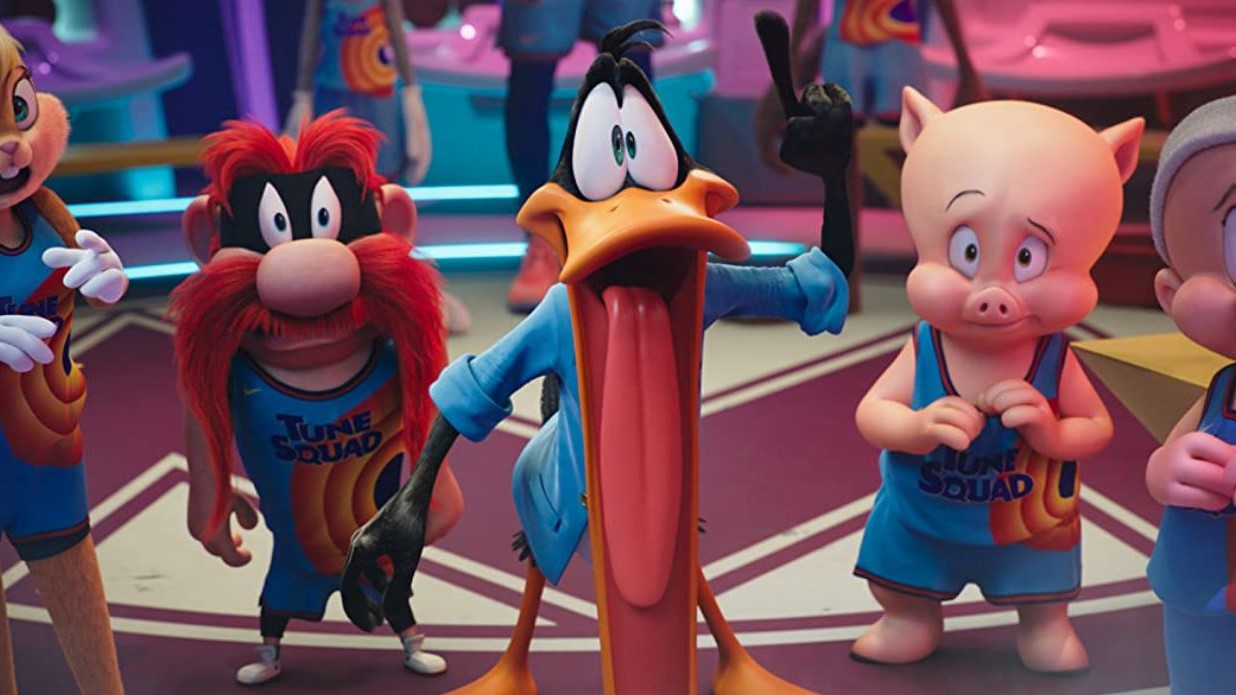What to Watch Verdict
Everyone understood the assignment. The assignment was just never going to be a good idea.
Pros
- +
🐰 Sometimes the Looney Tunes get to do Looney Tunes things.
- +
🐰 Don Cheadle is a charisma machine.
Cons
- -
🐰 This is exactly as cynical a commercial as it appears to be.
- -
🐰 For the most part, it's barely even trying to be funny.
- -
🐰 The plot devolves into absolute nonsense.
As I drove home from the theater after watching Space Jam: A New Legacy, I couldn’t help but think of the time, energy, and talent that was put into what I’d just witnessed. Malcolm D. Lee is the kind of well-regarded comedy director that feels increasingly rare. Don Cheadle is a pure charisma machine. Hundreds of animators and digital artists rendered layers upon layers of images meant to provide visual splendor and provoke slapstick laughter. Even LeBron James is a passable actor, turning in much more charm than Michael Jordan ever did in this film’s predecessor.
There is so much at work to make A New Legacy more than the cynical exercise in intellectual property management it so painfully, necessarily contorts itself into. But this isn’t a Lord & Miller deconstruction. There is no underlying examination of the various brands that constitute the Warner Brothers film catalog, no unifying theme that ties together this overstuffed bacchanalia of disparate stories, characters, and settings. Because there isn't any to be found. Let’s call this what it is. Much like the original Space Jam, this is a glorified commercial, plain and simple. But now, even worse, it’s a dick-measuring contest with Disney to convince WB’s shareholders that they’re betting on the horse with all the right franchises.
That isn’t to say that the three credited screenwriters (Juel Taylor, Tony Rettenmaier, and Keenan Coogler) aren’t trying to make something comprehensible and entertaining out of their corporate mandate. LeBron (playing himself) butts heads with his son Dom (Cedric Joe) as he insists that Dom focus on the fundamentals of basketball rather than have fun, while Dom is much more interested in programming a basketball video game that gives points for style in addition to the usual tallies for buckets. This wedge only gets driven deeper when Dom is kidnapped by Al G. Rhythm (Cheadle), an AI construct who operates the Warner Brothers Serververse – a digital space where WB properties are real and sentient – and wants to copy LeBron’s likeness to insert him into popular movies and shows. For some reason, he decides that challenging LeBron to a basketball game in exchange for his son is a sound strategy, only for Dom’s programming skills to turn out to be a secret weapon in enabling Al G. to turn the basketball game into the stylized version of Dom’s dreams.
If you’re wondering how the Looney Tunes enter into this, it’s no less contrived than it was when Michael Jordan did this shtick 25 years ago, but it’s also much more overcomplicated. Basically, all the Tunes except Bugs Bunny have gotten bored with being Tunes and have gone off to the other parts of the Serververse to, uh, find their bliss, I guess. Now, while LeBron pushes to get some players with actual potential on their team, Bugs uses this as an excuse to round up the other Looney Tunes as their teammates instead, reuniting the Tune Squad in spite of their lack of fundamental basketball knowledge. The one exception to this is, of course, Lola Bunny (now voiced by Zendaya for some reason), who feels like she has some scenes on the cutting room floor for how overemphasized she is among the rest of the team, only to amount to little more than the team's most notable girl. Again.
To the film’s credit, there is an extended commitment to rendering the Tunes in their authentic 2D style for most of the runtime, as they only get “upgraded” to their decidedly uglier 3D-rendered versions during the basketball game itself. And when the Tunes are actually allowed to be looney, there are some pretty decent slapstick gags to be found. However, the lion’s share of this screentime is devoted to tortuous parodies of whatever IP is on the obligatory corporate checklist, and absolutely none of it works. In fact, calling them parodies is generous, because they aren’t even jokes. They’re just references, visual recreations to point at in numb recognition of what else you could be watching on HBO Max.
This doesn’t get any better by the time the actual basketball game comes around. As the trailers prominently displayed, the game audience is full of extras dressed as the various characters of a multitude of films and TV shows, as well as digital renderings of other cartoon properties, and they are a persistent distraction from the action in the foreground. It feels less like an accident of misplaced priorities than a purposeful bombardment of branded imagery, because Warner Bros. doesn’t care that you’re following the plot. They care that you remember who owns Batman, Pennywise, and The Iron Giant.
As for that all-important plot, while I want to give higher marks to the screenwriters for at least trying to do something novel with its father-son conflict, the way the narrative devolves into utter nonsense in the third act is a cascade of bad decisions and get out of jail free cards. The idea of the Goon Squad being superpowered video game characters to counteract the cartoon abilities of the Tunes is potentially interesting, but it only works as presented if you assume that video games don’t operate on any set rules or limitations. It’s like the writers have never even played a video game before, and anything remotely outside the bounds of reality might as well be magic and deus ex machina. This becomes especially apparent as Al G. constantly – and I do mean constantly – changes the stakes, peril, and actual rules of the game without any sort of consistency, thereby sucking out any tension before it has a chance to build. This culminates with a series of plot points that not only violate rules that the film established not five minutes prior, but are so farcically ridiculous that it only becomes unintentionally hilarious when you're asked to take it with deathly serious sincerity.
Look, I am happy to admit that I found more pleasure in Space Jam: A New Legacy than I was expecting. The cartoons get to do some silly cartoon antics sometimes, there’s a cameo gag that legitimately made me laugh, and Don Cheadle, for as much as his character doesn’t make any sense whatsoever, is putting on a very entertaining persona. But none of this overcomes the film’s perversely cynical reason to exist. Any self-awareness on the part of WB’s producers, that they appear to make decisions that resemble inhuman algorithmic regurgitation of things people already like, is drowned out by their decision to make a film that is exactly that kind of regurgitation. Credit to the clearly talented parties who tried to build art upon an artless foundation, but it's a depressing waste of those talents.
Space Jam: A New Legacy opens in theaters and on HBO Max on July 16, 2021.
Leigh Monson has been a professional film critic and writer for six years, with bylines at Birth.Movies.Death., SlashFilm and Polygon. Attorney by day, cinephile by night and delicious snack by mid-afternoon, Leigh loves queer cinema and deconstructing genre tropes. If you like insights into recent films and love stupid puns, you can follow them on Twitter.












